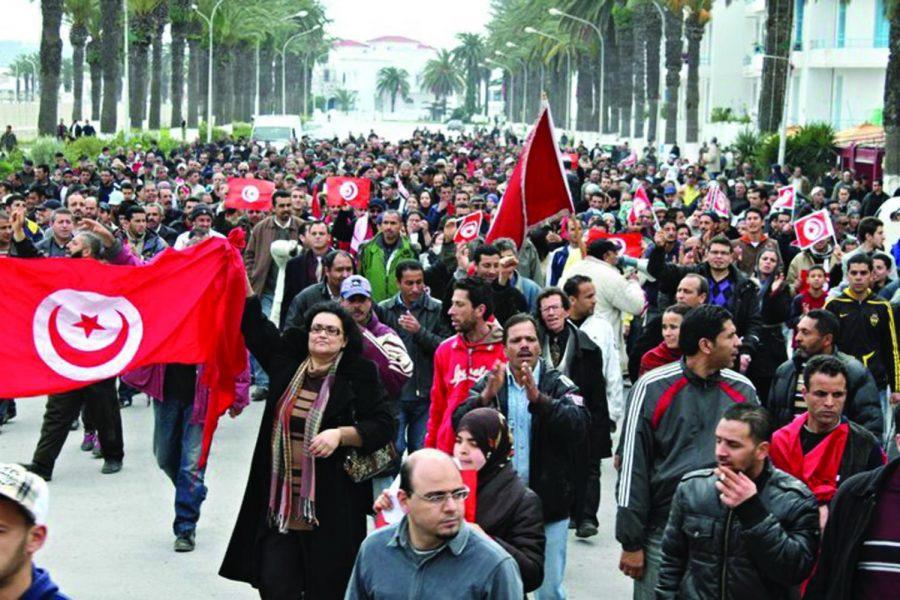Tunisians unite to dissolve regime
February 3, 2011
It began with 26-year-old college graduate Mohamed Bouazizi, who set himself on fire in protest of the lack of opportunity for Tunisian youths in a country where 25 percent of college graduates are unemployed.
That was the spark that ignited the so-called Jasmine Revolution that united the people of Tunisia and resulted in the ousting of the president.
The protesters utilized social networking tools like Facebook, Twitter and YouTube to organize mass demonstrations and broadcast them to a worldwide audience. It was a media-driven revolution in a country where all communication is controlled by the government.
Such an uprising came from an unlikely place. Tunisia has relatively liberal social norms and notions of gender equality, a substantial middle class and tourism is one of its major industries.
The country has tight gun control laws and a zero tolerance policy for extremism. But the denial of individual rights in exchange for security created discontent in the Tunisian people that only needed a trigger.
The success of the Tunisian revolution has inspired and catalyzed similar popular uprisings in other countries, most notably Egypt and Algeria. The impact is being felt all across the Arab world.
“We feel so happy for the Tunisians,” said Maher Jilani, a UNA student from Jordan. “They are doing what we all want to do. We all use the same language, and though we speak different dialects, we feel the same bond.”
Events in Tunisia have put government officials in other countries on guard. It is questionable at this point whether or not its success will be an isolated incident.
Jilani believes that the amount of democracy that was already present in Tunisia helped them to acquire the necessary taste for freedom, a possibility that would seem inconceivable to people in more repressive countries in North Africa.
“What’s happening in Egypt is similar to Tunisia,” Jilani said. “But in many other Arab countries the people are not mature enough democratically the way the Tunisians are. They feel like slaves; like there’s nothing they can do to change anything.”
UNA student Allison Ray spent last summer studying abroad in Tunisia and witnessed the Tunisians’ dissatisfaction with the government firsthand.
“When I got there I realized that speaking negatively about the government in public was not safe,” she said. “It took a long time for people to be upfront with me. Once I gained their trust, they became adamant about not being happy with the way things were. Where they are economically doesn’t reflect the amount of freedom in the country.”
Ray has stayed in contact with her Tunisian friends via Facebook and Skype. They posted live video feeds of protests long before they were broadcast on CNN and Al-Jazeera, allowing her to witness the raw fervor of the events.
“When the president fled you’d think something miraculous had happened,” said Ray. “No one was expecting that. After that, the momentum was substantial and hopefully they can maintain that momentum through the elections.”
Ray is excited that the Tunisians are standing up for themselves, but worried about the safety of her friends. She regrets that Tunisians may be portrayed in the media as violent people.
Though President Zine-el-Abidine Ben Ali has fled the country, the protestors are demanding that the remaining members of his government step down, and that democratic elections be established. If their demands are met Tunisia may become the first genuine Arab democracy.
“They’re going to start a new Tunisian bible of government,” said Jilani. “They’re going to be able to choose their own leader and choose their own future, but problems aren’t going to be solved immediately. It will take some time.”
So far the revolution has proceeded without a leader. The only discernable icon the protestors rallied around was the deceased Bouazizi, leaving a vacancy that could be filled by religious or political extremists who wish to take advantage of the upheaval.
“Ben Ali monopolized all the resources of the country, and that was very harmful to the economy of Tunisia,” said Youssef Elbarhmi, a UNA grad student from Morocco. “But if the new government is not elected democratically, it will still be the same.”
Elbarhmi thinks the revolutions in Tunisia and Egypt create a conundrum for the Obama administration because the U.S. has supported the regime in Tunisia due to its refusal to harbor terrorists. The U.S. has supported Egypt because they are on better terms with Israel than other countries in the region, and they have enforced a blockade preventing weapons from flowing into Hamas-controlled Gaza.
“Our government is claiming to support what’s happening in Tunisia,” said Ray. “But they are supporting the dictatorship at the same time. Are we going to do the same in Egypt?”











